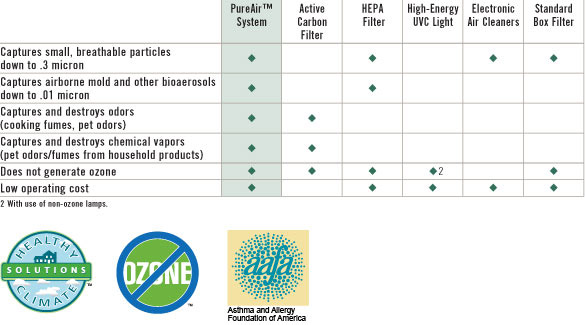The Importance of Indoor Air Quality
Do you struggle with allergies? Do you have issues with mold, pollen, pet dander, or second hand smoke?
Watch the video to learn how a good air purification system can improve your indoor air quality and relieve your symptoms.
Get the PureAir™ Purification System Total home comfort, and get peace of mind
The Mayo Clinic has found that air cleaners attached to whole-house systems are generally more effective than freestanding air cleaners. An optimal solution for central HVAC systems, the PureAir™ Air Purification System installs easily on the furnace or air handler (return air side), where a filter would typically be placed.
Odors and chemical vapors can come from many different sources inside and outside the home. Once inside the home, these pollutants circulate through the ductwork, entering every room and living space. Using innovative air-purification technology, the PureAir System helps remove the hundreds of odors/chemical vapors that can contaminate your home’s air.
Unmatched cleaning power of the PureAir™ system, compared to other technologies

Why should you keep your home’s air clean?
Poor air quality can lead to poor health.
Pollutants in your home’s air can cause dizziness, headaches, nasal congestion and fatigue, plus they can aggravate allergies and asthma.
Causes of indoor air quality problems
Pollutants can come from many different sources inside and outside the home. For instance, furnishings such as upholstery may release chemicals into the air. These pollutants circulate through ductwork, entering every room and living space. And if ventilation is inadequate, the pollutants multiply. High temperature and humidity also increase concentrations of some pollutants.
Do you see what’s wrong with this picture?
Just because you can’t see the problem doesn’t mean it isn’t there.
No home is immune to indoor air quality (IAQ) problems. All homes can contain elevated concentrations of dust, dirt and chemicals. These impurities may not be visible to the naked eye. Homes can also be breeding grounds for mold and mildew.
According to the Environmental Protection Agency, the air inside the average home is up to five times more polluted than the air outside.*
Results from in-home air tests across North America support this government finding. Nearly every home (96%)** had at least one IAQ problem:
- 86% had high levels of particles and bioaerosols like dust, pollen and viruses
- 71% were filled with odors and potentially harmful chemicals and gases
- 46% had problems with temperature and humidity
*Source: www.epa.gov/iaq, June 27, 2001 **Source: AirAdvice 2004 field study – 10,254 tests
How to solve the problem of unhealthy air
| The Problem |
Why it's a Problem |
The Solution |
 Odors/Chemical Vapors (Perfumes, cleaning supplies, solvents, pet odors, cooking fumes) Odors/Chemical Vapors (Perfumes, cleaning supplies, solvents, pet odors, cooking fumes) |
Airborne chemicals can cause headaches, fatigue, nausea, rashes, dizziness and, in some cases, severe illness. |
Purification – To combat toxins like chemicals, you have to destroy them. The PureAir™ air purification system safely and effectively removes and destroys chemical vapors and odors. Ventilation – These systems replace stale indoor air with fresh air from outside, which helps dilute the power of toxic chemicals commonly found in household furnishings. |
 Particles (Pollen, dust mites, dirt, pet dander) Particles (Pollen, dust mites, dirt, pet dander) |
Airborne chemicals can cause headaches, fatigue, nausea, rashes, dizziness and, in some cases, severe illness. |
Filtration – High-efficiency filtration products are designed to capture small particles and keep them from recirculating back into your home’s air. This also helps maintain the efficiency of your HVAC system. |
 Bioaerosols (Bacteria, viruses, mold) Bioaerosols (Bacteria, viruses, mold) |
Biological contaminants can cause or aggravate asthma, as well as hay fever and other allergies. |
Humidity Control – Products like the Humiditrol® whole-home dehumidification system help prevent moisture buildup, which can promote the growth of mold and mildew. |